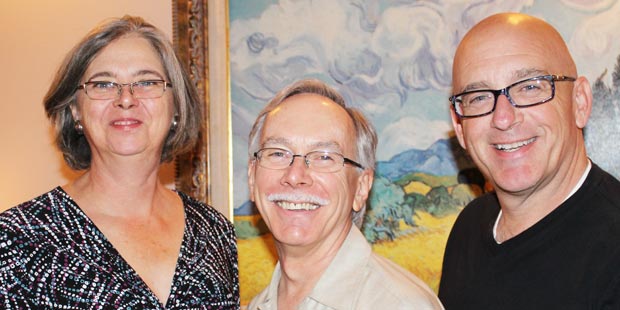Therapists say that focus has changed over the years from being primarily on HIV to things like marriage and parenting
DAVID TAFFET | Staff Writer
taffet@dallasvoice.com
When Deborah Beckman and Tim Myrick registered the name Uptown Psychotherapy Associates in 1996, fewer than 10 other business were using the term “Uptown.”
When they renewed their name 10 years later, more than 600 businesses had it as part of their registered name.
But that’s not all that’s changed during Beckman and Myrick’s 15 years in business together.
The two met in 1994 when they were interning at Legacy Counseling. When they opened their private practice, the main issue they continued to confront was AIDS.
Will Handy, who joined Myrick and Beckman a few years after they started their practice, still works at Legacy while maintaining his private practice at Uptown.
“In the old days, it was about helping people deal with the end of their lives,” Handy said.
Beckman said that now she works with her HIV-positive clients on issues of aging, supporting stability and incorporating taking medication into a routine that’s as normal as brushing your teeth.
Uptown and Legacy still have a good working relationship.
“If someone calls Uptown and cannot afford private therapy, we refer them to Legacy and know they’ll get good care,” Handy said. “Legacy will sometimes refer to us if a private setting will help a client more.”
Uptown has the only private HIV-positive support group in the area, Handy said, adding that although members have changed, the group has been around since the practice opened.
That gives the group and the therapists the collective wisdom of 15 years’ worth of members, Handy said.
Today, Beckman said, only about a third of her clients list HIV as their main concern. She said she hears a lot of relationship issues. And with the current economic crisis, she speaks to many people trying to make decisions about their careers.
Beckman said one of the most common questions she hears is, “What do I want to do next?”
One thing that hasn’t changed much, both Beckman and Hardy said, is how people talk about their relationships.
Over the past 15 years, same-sex marriage has been legalized in a number of states, but both therapists said gays and lesbians have always taken their own relationships seriously. It’s just that now, with marriage equality becoming a more high-profile issue, other people are taking those relationships more seriously, too.
Myrick, Beckman and Handy said they work with many people whose original religious foundation was punitive.
“Some are in a state of reaction to what amounts to religious persecution,” Handy said. “Others haven’t reacted to that enough.”
Beckman said that the difference over the past 15 years is that now so many churches have adopted an attitude of “Who’s gay? Who’s straight? Who cares?” She said that when she started in practice, she could hand out a very short list of churches that would welcome the LGBT community.
“Now people really can find a church that fits,” she said. “We can give directions on how to go church shopping.”
More and more gays and lesbians are deciding to have children. And Beckman and Handy discuss with their clients what parenting means and why they want to be parents.
Are they doing it “to prove they’re super parents, or are they doing it for the kid?” Beckman asked.
Handy added that it is the therapists’ job to make sure that couples and individuals want to be parents for “all the right reasons.”
Handy and Beckman both agreed that the best change over the past 15 years has been among some of their youngest clients:
They have some need to come to therapy but they’ve been OK about being gay since they were young.
They’ve had gay role models, had other friends who were out in school and watched gay characters on television.
Handy said it was a big difference from when he was the first and only out licensed therapist in Madison, Wisc.
“It’s truly heartening. A joy to experience,” he said. And he’s learned a valuable lesson from those younger clients: “Don’t go looking for trauma when it isn’t there,” he said.
This article appeared in the Dallas Voice print edition September 9, 2011.

